With marijuana legalized in more states, many canine cops are headed for retirement
The legalization of marijuana in Minnesota marked the end of an era for the canine officers of the Olmsted County Sheriff's Office.
Jango, a 9-year-old German shepherd, and Cobra, a 10-year-old Belgian Malinois, are set to retire soon after the legislation takes effect Aug. 1, Capt. Ryan Mangan said. They are the department's last K-9s trained to detect cannabis, a skill the department stopped teaching new dogs years ago and probably never will again.
Mangan said Jango and Cobra, who were already reaching the end of their careers, will be relegated to patrol work before their retirement in September because they probably can't be trained to stop detecting marijuana, which could compromise narcotics searches.
Replacing them will be expensive. A dog trained to do both patrol work and drug detection will cost the department nearly $12,000, Mangan said. And the death of another dog on the team dealt an unexpected blow to the unit.
"Now we're kind of scrambling to come up with a plan to be able to get a new dog purchased and get the K-9 team up and running again," he said. "Something like that is a big-budget item."
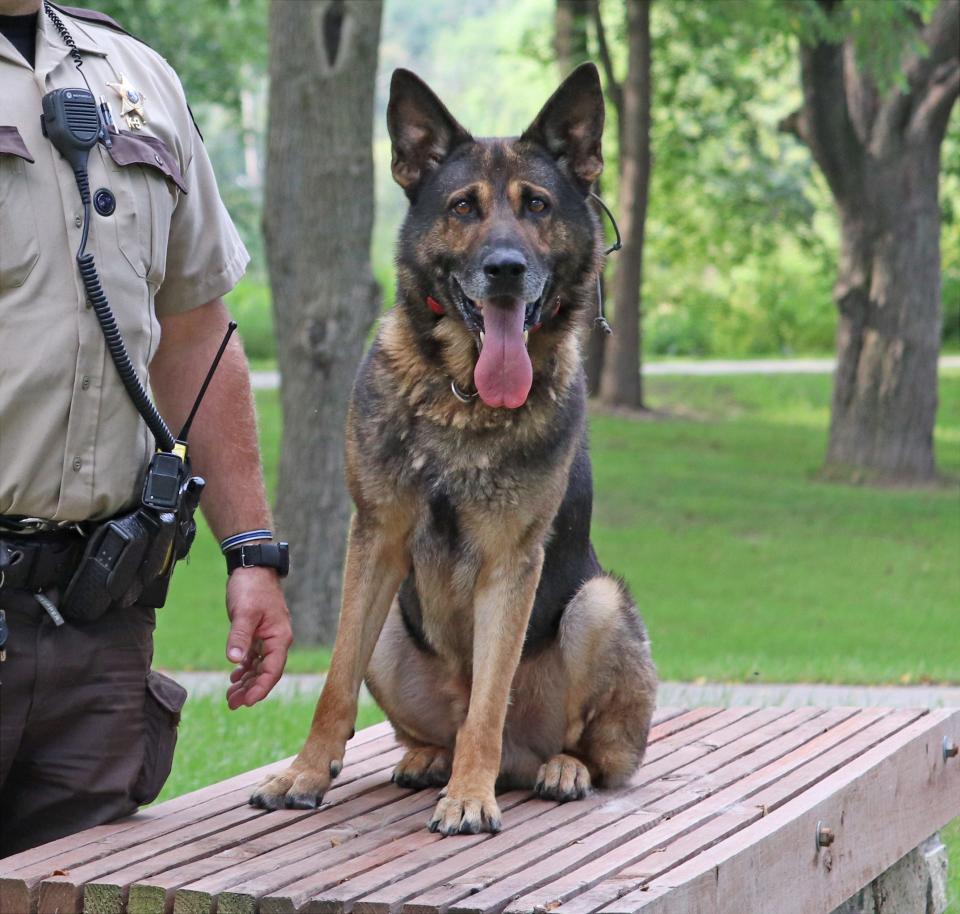
Although a foundation helps pay for new equipment and the monthslong training for dogs and handlers, Mangan said, the department was unable to secure one of the highly in-demand grants from the American Kennel Club and will have to cover the cost of the dogs on its own.
Departments nationwide, including Mangan's, have been preparing for the possibility of marijuana becoming legal and can offset the costs of new police dogs through grants and donations. Lawmakers and some smaller departments have expressed concern about the time and money it will take to replace what they consider vital assets, despite studies that suggest searches prompted by the dogs often don't result in drug seizures.
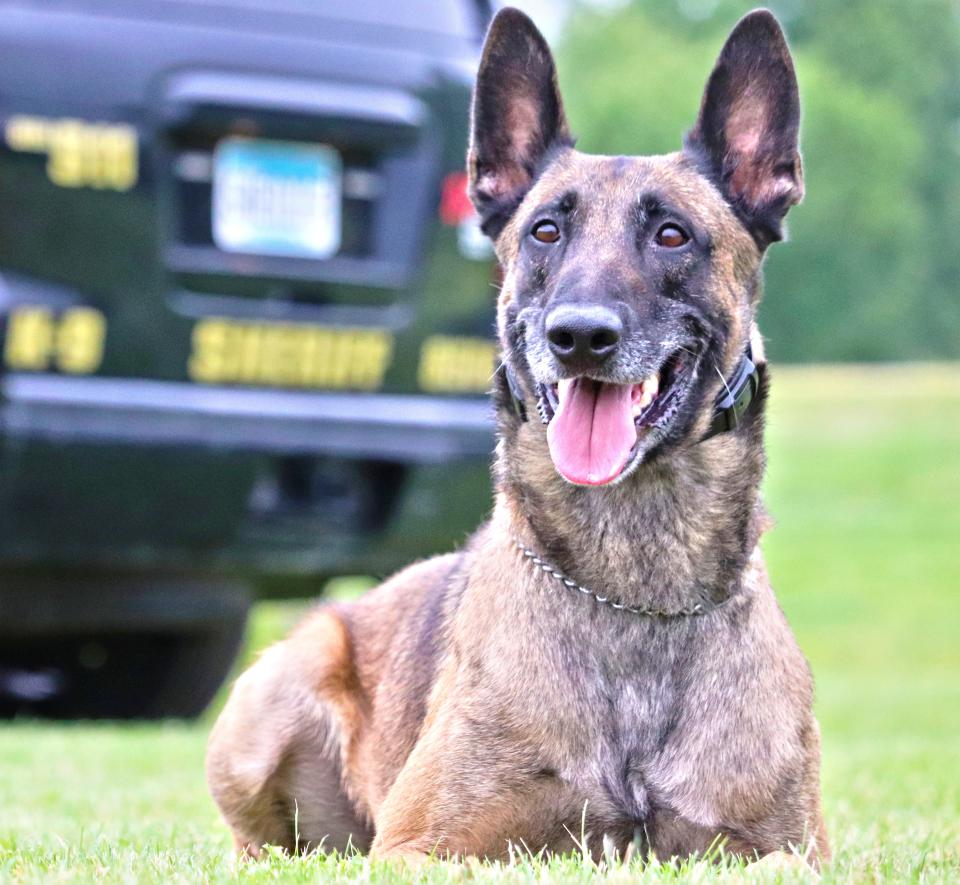
Training K-9s can be expensive and time-consuming
To offset the cost of police dogs, AKC Reunite, a nonprofit affiliate of the American Kennel Club, doles out grants to departments around the country, according to CEO Tom Sharp.
Last year, the nonprofit gave out 200 $7,500 grants by October to communities that were able to raise an initial $2,500, Sharp said. The nonprofit plans to hand out 250 grants this year and is closing in on that goal, Sharp said.
"A lot of the grants go to smaller police and sheriff's departments who, many of them, either have never had a K-9 program, or maybe they had one but they haven't had it for the last few years," he said.
Unlike the sheriff's office in Olmsted, the St. Cloud Police Department in Minnesota secured a grant to cover the bulk of the cost of a dog to replace Parker, their last K-9 officer trained to detect marijuana, according to Sgt. Brian Cameron.
While Parker, a German shepherd, spends his days being spoiled by Cameron and his fiancee, the department is preparing for the arrival of his replacement, probably another shepherd who comes with a $10,000 price tag.
But money is just one factor. Cameron said there's concern about staffing while the new dog takes a 12-week course with its handler to learn how to apprehend suspects and detect drugs including methamphetamine, cocaine, heroin and potentially fentanyl.
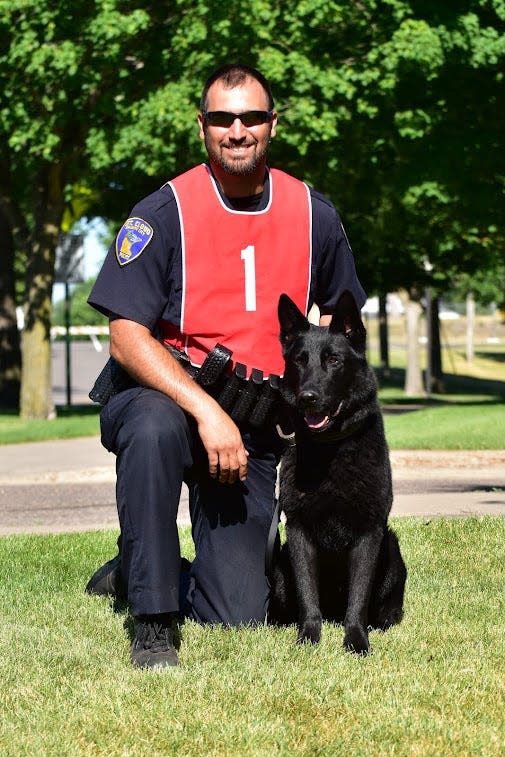
"By the time you spend $14,000 for a dog, then you have to spend $6,500 for a handler's course, smaller agencies can't afford that," said Sgt. William Brown, head K-9 trainer for the Kansas City Police Department in Missouri. "Bigger agencies can't afford that."
Brown said some small law enforcement agencies in Missouri, where voters approved recreational marijuana in November, send their K-9 teams to train with him.
"Fortunately, for me and them, I'm able to train their dogs for them along with the handler, because my agency allows me to do it when I'm working," he said.
In Maryland, Talbot County Sheriff Joe Gamble put the estimate even higher, saying the cost of a new dog, training, equipment and a handler could be nearly $50,000. When the dogs retire, typically to the homes of their handlers, the department is still on the hook for up to $10,000 in veterinarian costs over the course of their lives, Gamble said.
But Gamble noted all seven of the canines his department has had were purchased for the department by people or nonprofit organizations in the community on Maryland's Eastern Shore.
"When I tell the other sheriffs that, they can't believe that like people actually do that," he said. "But it's very wealthy county, too."
Marijuana training could compromise searches
Though Gamble is less concerned about the cost of the dogs, he said he is worried about how Maryland's new marijuana law will affect police work going forward and called the way it was written "nothing short of horrendous."
A 2005 Supreme Court decision means an alert from a drug-detecting dog during a traffic stop gives an officer probable cause to search a vehicle without a warrant, Gamble said. He said that in his jurisdiction, searches initiated after the smell of marijuana often net other drugs like heroin or illegal firearms.
"That will drop dramatically in Maryland − the amount of illegal handguns that are seized on our highways − because that's one less way to be able to search a car," he said, adding that the department is planning to track the data.
But he said that if a dog trained to detect marijuana was used during such a search, it could be challenged in court, which led his department to retire one dog, a Labrador retriever named Raven, on July 1 when recreational marijuana became legal in Maryland. He said another dog, Kato, was reassigned to patrol work and eventually may be retired or sold to a department in another state with stricter marijuana laws.
"We just don't need the headache of defense attorneys," he said.
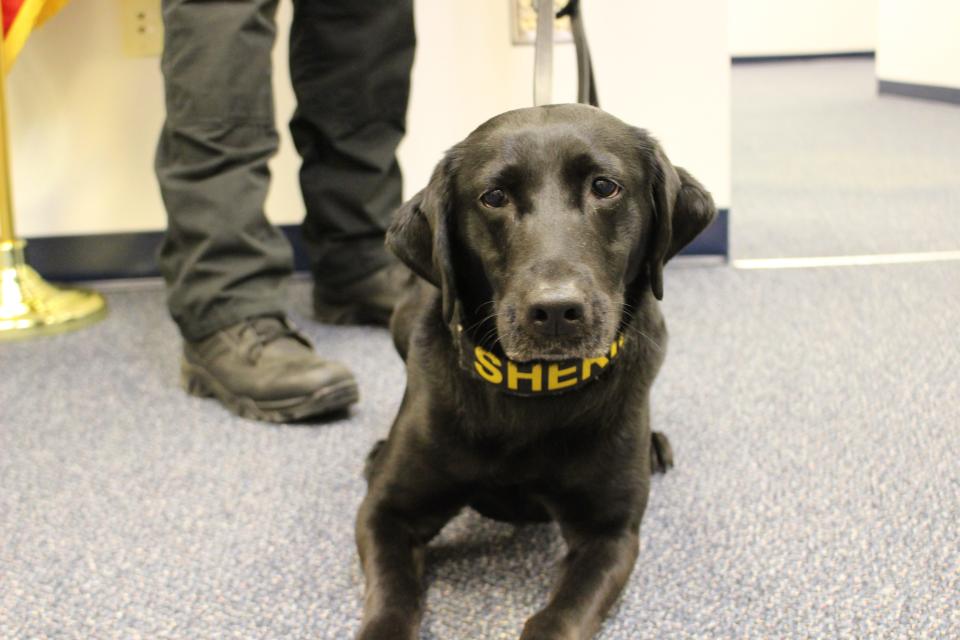
Don Slavik, executive director of the United States Police Canine Association, also said retirement or reassignment are the easiest options because the dogs probably can't be retrained to stop detecting marijuana or used for another scent-related job like explosive detection.
"It's just a shame that the dogs are being deactivated because of the one odor, but then again, you can't absolutely for sure untrain or distinguish the odor of marijuana in a dog or any odor for that matter," Slavik said.
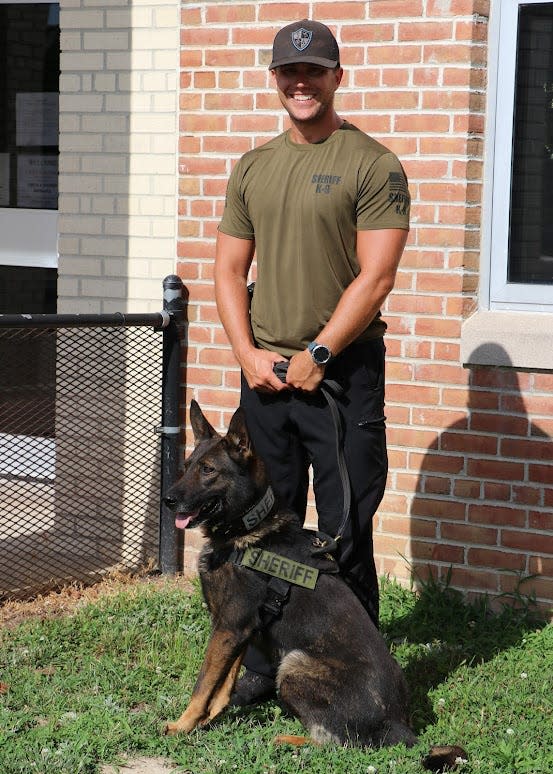
But some departments may be willing to take the risk. Though the St. Louis Metropolitan Police Department will stop imprinting new dogs on marijuana, there are no plans to retire any of the its K-9s, public information officer Evita Caldwell said.
"They'll still be participating in searches involving other illegal narcotics not involving marijuana, which they have training on and are still useful for," Caldwell said.
"However, again, and speaking on marijuana specifically, we won't be utilizing our K-9s to detect that," she said.
Are drug-detecting dogs reliable?
Though the dogs are a "great tool," they, like human officers, are susceptible to bias, according to Lawrence Myers, a retired Auburn University professor who has studied detection dogs.
A 2019 investigation by the Louisville Courier Journal, part of the USA TODAY Network, found that in nearly half of the 139 traffic stops since 2017 in which drug dogs indicated the presence of narcotics inside a vehicle, none were found. A 2011 Chicago Tribune analysis of three years of suburban police department data similarly found less than half of alerts by dogs led to the discovery of drugs or paraphernalia during vehicle searches.
"I've been an expert witness on I have no idea how many cases involving all sorts of things including drugs," Myers said. "And in some cases, I'm afraid certain officers have viewed the dog as a search warrant on a leash."
Police departments and the Supreme Court have argued that even when no narcotics are found during a search prompted by a dog's alert, it doesn't mean they were wrong.
"The dog may have detected substances that were too well hidden or present in quantities too small for the officer to locate. Or the dog may have smelled the residual odor of drugs previously in the vehicle or on the driver’s person," Justice Elena Kagan wrote in a unanimous 2013 decision, which determined a dog’s performance in the field is irrelevant as long as it is "certified" once a year by a reputable canine organization.
Myers said better training and a better understanding of the ways a handler may cue a dog to alert, unintentionally or otherwise, could help address the question.
Police dogs "are quite valuable," he said. "But there is room for improvement. And there is unfortunately sometimes room for abuse."
Contributing: Andrew Wolfson, Louisville Courier Journal
This article originally appeared on USA TODAY: Why legalized marijuana is sending some police dogs into retirement


